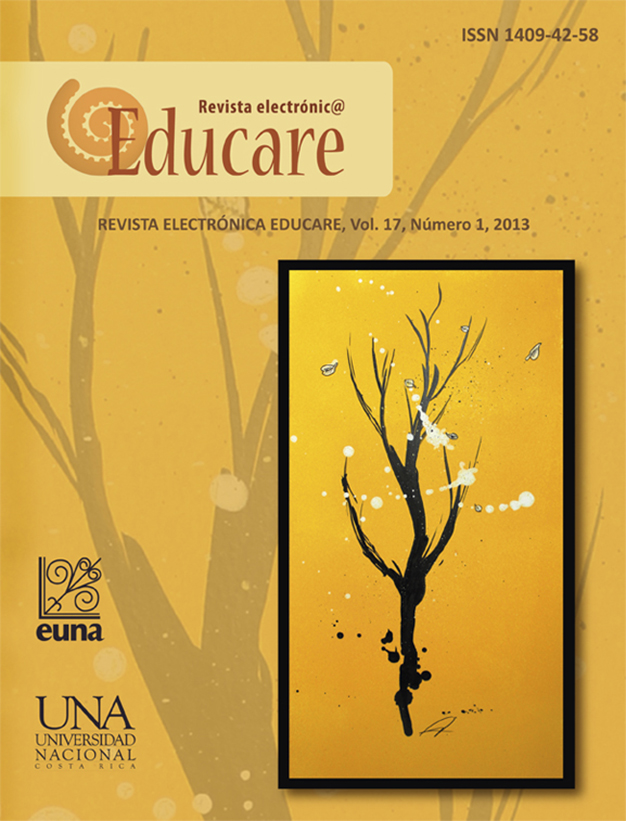Students’ Identities and Pedagogical Challenges
DOI:
https://doi.org/10.15359/ree.17-1.3Keywords:
Pedagogy, students’ identities, pedagogical challenges, university, students, first-year, orientation, Educare Electronic Journal, Costa Rica.Abstract
This article is a result from the orientation process carried out for the first-year students of four study programs of the Basic Education Division at the Center for Research and Teaching in Education (CIDE), Universidad Nacional, Costa Rica, in 2012. Information from 110 students was collected and analyzed with the purpose to identify the students’ identity traits and possible pedagogical challenges associated. The actions taken during the design and execution of the orientation process and the data collected through different instruments were taken into account for the analysis. The findings include strong areas, as well as areas “to be developed” which represent the pedagogical challenges of the academic unit. The Basic Education Division (or School of Basic Education) plays a fundamental role in the country’s social and cultural transformation preparing professionals in Education and providing students with the necessary tools for developing better skills in areas such as art, writing, technology, sports, and public speaking. These are some of the challenges emerging from the analysis of the orientation process for first-year students.
References
Camacho, M., Espinoza, R. A., Herrera, A., Ruiz, L. S., Segura, S. y Vásquez, E. (2011a). Programa
de Desarrollo Académico y Gestión Organizacional de la División de Educación Básica.
Manuscrito inédito. Heredia, Costa Rica: División de Educación Básica, Universidad
Nacional.
Camacho, M., Espinoza, R. A., Herrera, A., Ruiz, L. S., Segura, S. y Vásquez, E. (2011b). Informe de
Avance del Programa Académico y Gestión Organizacional. Universidad Nacional, Heredia,
Costa Rica. Manuscrito inédito. Heredia, Costa Rica: Universidad Nacional.
Camacho, M., Castillo, R. A., León, H., Miranda, A., Pereira, Z. y Vásquez, E. (2012). Informe Proceso
de Inducción Estudiantes Primer Ingreso 2012. Manuscrito inédito. Heredia, Costa Rica:
División de Educación Básica, Universidad Nacional.
Camacho, M., Espinoza, R. A., Herrera, A., Ruiz, L.S., Segura, S. y Vásquez, E. (2012). Informe Final
del Programa de Desarrollo Académico, 2011. Manuscrito inédito. División de Educación
Básica Heredia, Costa Rica: Universidad Nacional.
Castillo, R. y Espinoza, R. (marzo de 2010). La universidad como organismo vivo: De la profesión a
la humanidad. Congreso Internacional de Educación Superior (CIESUP). Llevado a cabo en
el Congreso de la Universidad Nacional, San José, Costa Rica.
Guevara, H. M. (enero-junio, 2009). Identidades estudiantiles, conocimiento y cultura.
Percepciones de jóvenes universitarios y universitarias de Cuyo, Argentina. Revista
Latinoamericana de Ciencias Sociales, Niñez y Juventud, 7(1), 209-234. Recuperado de
http://redalyc.uaemex.mx/src/inicio/ArtPdfRed.jsp?iCve=77307109
Maturana, H. (2008). El sentido de lo humano. Santiago, Chile: J. C. Sáez editor.
Ocampo, E. (2007). El estudiante en la perspectiva de la pedagogía ignaciana: De la ratio a
nuestra realidad. Pontificia Universidad Javeriana. Recuperado de http://www.puj.edu.co/
pedagogia/documentos.html
Pereira, Z. (noviembre, 2010). Las dinámicas interactivas en el ámbito universitario: El clima
de aula. Revista Electrónica Educare 14(Extraordinario), 7-20. Recuperado de http://www.
revistas.una.ac.cr/index.php/EDUCARE/article/view/1524
Universidad Nacional Costa Rica. (2005). Modelo pedagógico de la Universidad Nacional de
Costa Rica. Heredia, Costa Rica: Autor. Recuperado de http://unaweb.una.ac.cr/index.
php?option=com_remository&Itemid=0&func=startdown&id=141
Venegas, M. E. (2009). ¿Cómo se forman los docentes para las escuelas en Centroamérica y República
Dominicana? San José, Costa Rica: Coordinación Educativa y Cultural Centroamericana.
Downloads
Published
How to Cite
Issue
Section
License
1. In case the submitted paper is accepted for publication, the author(s) FREELY, COSTLESS, EXCLUSIVELY AND FOR AN INDEFINITE TERM transfer copyrights and patrimonial rights to Universidad Nacional (UNA, Costa Rica). For more details check the Originality Statement and Copyright Transfer Agreement
2. REUTILIZATION RIGHTS: UNA authorizes authors to use, for any purpose (among them selfarchiving or autoarchiving) and to publish in the Internet in any electronic site, the paper´'s final version, both approved and published (post print), as long as it is done with a non commercial purpose, does not generate derivates without previous consentment and recognizes both publisher's name and authorship.
3. The submission and possible publication of the paper in the Educare Electronic Journal is ruled by the Journal’s editorial policies, the institutional rules of Universidad Nacional and the laws of the Republic of Costa Rica. Additionally, any possible difference of opinion or future dispute shall be settled in accordance with the mechanisms of Alternative Dispute Resolution and the Costa Rican Jurisdiction.
4. In all cases, it is understood that the opinions issued are those of the authors and do not necessarily reflect the position and opinion of Educare, CIDE or Universidad Nacional, Costa Rica. It is also understood that, in the exercise of academic freedom, the authors have carried out a rogorous scientific-academic process of research, reflection and argumentation thar lays within the thematic scope of interest of the Journal.
5. The papers published by Educare Electronic Journal use a Creative Commons License:














 The articles published by Educare Electronic Journal can be shared with a Creative Commons License:
The articles published by Educare Electronic Journal can be shared with a Creative Commons License: 



